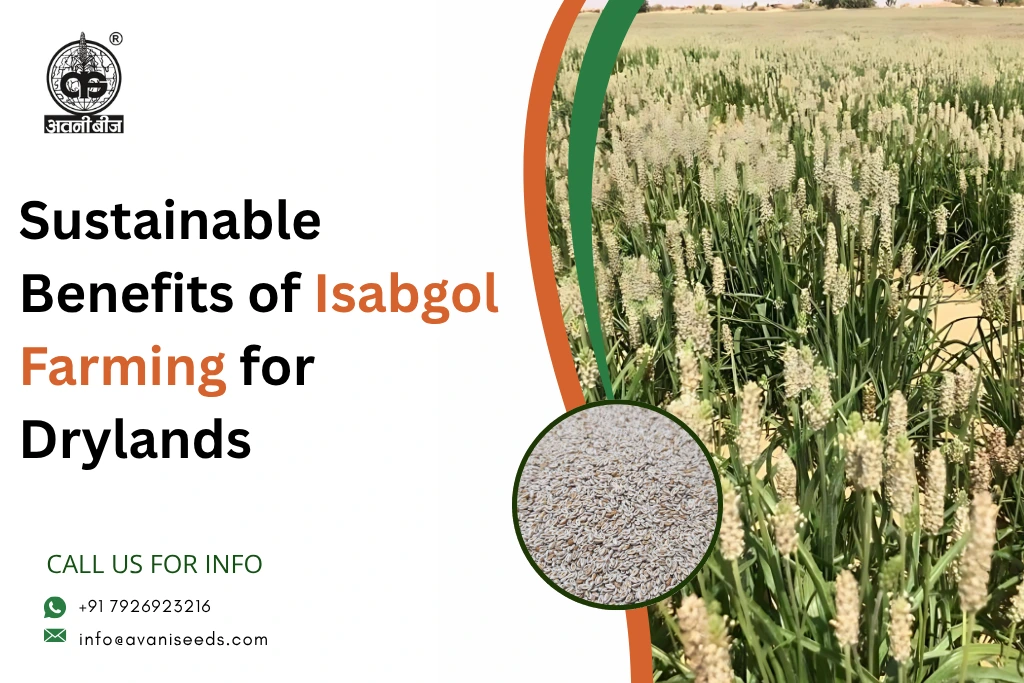As global agriculture faces increasing pressure from climate change, water scarcity, and soil degradation, farmers are actively searching for sustainable alternatives to traditional high-input crops. One such promising crop is Isabgol (Psyllium) – a medicinal plant known for its high-fiber husk used in pharmaceuticals and dietary products. In this blog, we’ll explore the sustainable benefits of Isabgol farming, with a focus on soil health, low water usage, and climate resilience.
What is Isabgol?
Isabgol, also known as Psyllium, is a cool-season crop primarily cultivated in arid and semi-arid regions of India. The seeds of the Plantago ovata plant are processed to extract the husk, which is widely used for its medicinal and dietary benefits. India is the largest Isabgol (Psyllium) seeds producer, with major cultivation taking place in Rajasthan, Gujarat, and Madhya Pradesh.
Isabgol Sustainable Farming: A Climate-Smart Choice
One of the core advantages of Isabgol sustainable farming is its minimal resource requirements. Unlike high-maintenance crops like sugarcane or paddy, Isabgol requires less irrigation, no chemical-heavy inputs, and thrives well in sandy-loam soils with good drainage. This makes it an ideal candidate for farmers in water-scarce areas.
Key Environmental Benefits:
- Low Carbon Footprint: Minimal use of synthetic fertilizers and pesticides.
- Drought Tolerance: Can be grown with just 3–4 irrigations in the entire cycle.
- Minimal Land Degradation: Grows without excessive nutrient depletion or erosion.
Low Water Crops for Dryland Farming
With water scarcity affecting farming productivity worldwide, choosing low water crops for dryland farming is becoming increasingly crucial. Isabgol fits this requirement perfectly:
- Irrigation Efficiency: The crop can thrive with limited water, making it suitable for rain-fed or semi-irrigated zones.
- Reduced Dependence on Groundwater: Helps conserve underground water tables, especially in regions where over-extraction is a concern.
- Saves Cost: Less irrigation translates to lower electricity and water costs.
Farmers who switch to Isabgol from water-intensive crops often notice a significant reduction in input costs while maintaining reasonable returns.
Benefits of Psyllium Farming for Soil Health
One of the underrated yet critical benefits of psyllium farming for soil health is its gentle impact on the soil ecosystem.
- Improves Soil Structure: Isabgol roots help in maintaining good soil aeration and reduce compaction.
- Supports Microbial Activity: The minimal use of chemicals encourages natural microbial activity, which is essential for long-term soil fertility.
- Crop Rotation Partner: It can be used effectively in crop rotation systems to reduce pest and disease cycles in other crops like cumin or wheat.
Isabgol’s natural compatibility with organic and regenerative farming practices makes it an asset for soil conservation efforts.
Climate Resilience and Future-Proofing Farms
Climate unpredictability — from irregular rainfall to rising temperatures – poses serious risks to conventional farming. Isabgol offers some resilience:
- Short Crop Cycle: Typically harvested in 110–120 days, making it less vulnerable to long-term weather disruptions.
- Thrives in Marginal Soils: Can grow in light, less fertile soils where other crops may fail.
- Low Input Dependency: Requires minimal fertilizers, making it more viable during supply-chain disruptions or price spikes.
By integrating Isabgol sustainable farming practices, farmers can diversify income while protecting themselves against climate risks.
Partnering with Reliable Agro Seeds Producers
To ensure high yield and quality, sourcing seeds from a reputed agro seeds producer and supplier in India is essential. Certified seeds not only improve germination rates but also contribute to better disease resistance and husk yield.
When choosing an Isabgol (Psyllium) seeds producer, consider:
- Certified and disease-free seeds.
- Seeds adapted to your local agro-climatic zone.
- Technical support or guidance during the crop cycle.
Reliable seed suppliers can also provide post-harvest solutions and market linkage, which further supports the farming ecosystem.
Conclusion
Isabgol stands out as a sustainable, profitable, and climate-resilient crop that aligns with the future of agriculture. Its low water requirement, soil health benefits, and compatibility with dryland and organic farming make it a valuable option for today’s environmentally conscious farmers.
Whether you are a farmer looking to diversify, an agri-entrepreneur, or a policymaker, Isabgol is worth serious consideration. Partner with a trusted agro seeds producer and supplier in India to start your journey toward sustainable and profitable farming.



